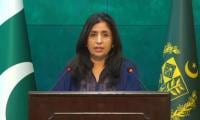ISLAMABAD: Pakistan on Thursday told the visiting International Monetary Fund (IMF) mission in plain words that Islamabad will not be looking towards Washington based lender of last resort for any fresh bailout package during the remaining tenure of the incumbent PML-N led regime.
However, the path of fiscal consolidation and controlling the yawning current account deficit will be pursued in order to overcome economic woes faced by the country. On the conclusion of Post Programme Monitoring (PPM) talks held between Pakistan and the IMF team here on Thursday, both sides confirmed that Islamabad made no fresh request for seeking any bailout package from the Fund. “The path of fiscal consolidation will not be lost come what may as Prime Minister Shahid Khaqan Abbasi has given us assurance the fiscal deficit will not be allowed to hike up to 5.8 percent of GDP just like the last fiscal year. The twin deficits, including the budget deficit and current account deficit, will be maintained at ‘manageable levels’ in a bid to protect the foreign currency reserves at comfortable position,” Federal Secretary Finance Shahid Mehmood told The News in his office on Thursday night.
Earlier, the IMF’s Mission Chief Herald Finger told journalists on Thursday evening that Pakistan made no formal request for any fresh bailout package from the IMF. He said that Pakistan successfully decoupled economy from politics as the country continued to achieve higher growth path for the current fiscal year as the Fund projected real GDP growth at 5.6 percent for fiscal year (FY18) against 5.3 percent achieved last FY17.
The IMF chief said that Pakistan had eroded fiscal and external gains after completion of the IMF programme as the fiscal deficit and current account deficit again hiked, resulting into emerging macroeconomic imbalances.
“With or without the IMF programme, Pakistan will have to pursue path of structural reforms. The electioneering year should not be made an excuse as some preparatory work is required before launching long term reforms,” he added. He deplored that the circular debt had again re-emerged and total accumulated losses of energy sector was on the rise. He made a point that now more power generation capacity made part of power system, so increased generation would lead to increased losses and piling up of further amount in the shape of circular debt.
When asked about the IMF’s assessment on the basis of which other multilaterals will start pouring multimillion dollars programme loans, the IMF chief said that the PPM report would be submitted before the Board within a couple of month period but he did not give an indication regarding the Fund’s upcoming assessments on various macroeconomic indicators, especially related to external accounts of the economy. He said that Pakistan would have to take several measures, including sticking to tightening of fiscal policy and avoiding depletion of foreign reserves, in order to protect its gains even during the period of pre-elections period. He said that political instability and security caused harms to country’s economic development, attracting investment and creation of jobs.
“The SBP’s decision for allowing depreciation of rupee is a welcome move in the right direction but this decision has been taken by the central bank and the IMF has played no role in it,” he said and added that the government took this decision after launching the Sukuk and Eurobonds to show that it was adjusting its exchange rate at point of strength not at point of weakens. He said that Pakistan lost grounds by allowing budget deficit hiking to 5.8 percent of GDP and current account deficit over 4 percent of GDP in the last fiscal year.
He said that Pakistan possessed potential to generate tax revenues to the tune of 22 percent of GDP as the country jacked up tax to GDP ratio from 10 percent to 12.5 percent under the last IMF programme.
To another impact of the China Pakistan Economic Corridor (CPEC) on external account, the IMF Mission chief said that Pakistan shared details of $23 billion regarding ongoing projects of the CPEC for which the country would have to repay around $3.5 to $4.5 billion on annual basis as repayment obligations.
Counsel for Parvez Elahi and Bhatti requested longer adjournment of hearing
Hutchinson was star witness of select committee that investigated Trump, and on which Cheney served as vice-chair
It is unclear if Trump, who at press conference on Monday was sporting his typical style
Analysts say India-US ties under Trump’s second administration will have to pass test of looming tariff war
Muhammad Khan will remain on this post till his retirement date 30th April 2025
CM said that on April 5, 1996, former prime minister Mohtarma Benazir Bhutto laid foundation stone of complex







